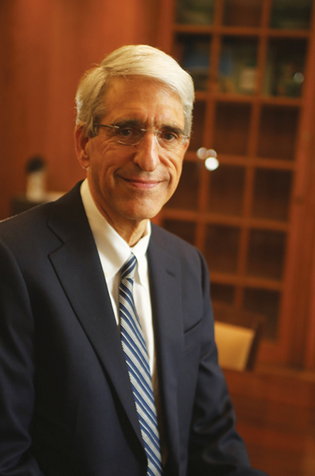
Mark Ostow
The Yale Alumni Magazine publishes a letter from President Peter Salovey ’86PhD in every issue. In this letter, the president discusses climate change and what Yale has done, and continues doing, to reduce it.
View full image
Dear Friends,
I have the opportunity to talk to thousands of Yalies each year. More than ever, people are concerned about climate change. As I write this letter, a number of Yale students, faculty members, and alumni are returning from the 2022 United Nations Climate Change Conference—also known as the COP27—held in Egypt this year.
During the Yale Alumni Association convocation and assembly, which took place a week earlier, I spoke with Ambassador Paul Simons while he was at COP27. At the Jackson School, he coordinates the new Yale Emerging Climate Leaders Fellowship, which supports early-career climate and clean energy practitioners from across the Global South as they cultivate their skills, expand their networks, and engage with clean energy and climate change leaders. In our discussion, it became clear that Yale has the distinct ability to build bridges for its students, as exemplified by this fellowship.
Indeed, in the face of a global threat like climate change, the collaborations we foster at Yale become that much more important. I am delighted to share with you two recent initiatives that build upon Yale’s efforts in developing cross-cutting climate solutions: the Climate Impact Innovation Fund (CIIF) and the Three Cairns Climate Program for the Global South.
Launched in late 2021 with a generous gift of $15 million, the CIIF provides grants that support faculty-led research and early-stage funds for higher-risk projects to drive innovation as part of our Planetary Solutions Project. We announced the first round of seed grants last April. CIIF funded twelve projects, and additional Yale funds supported another nine. Among them are studies that explore the conversion of carbon dioxide into building materials, fuels, and plastics; expand our capacity for harvesting energy from the sun; and redesign global trade policy for a low-carbon economic system.
The second new initiative supports the next generation of environmental leaders throughout the Global South, where many low-emitting countries are experiencing severe effects of climate change caused by the high-emitting countries of the Global North. The Yale School of the Environment (YSE) launched the Three Cairns Climate Program for the Global South in July with a generous gift from the Three Cairns Group. This initiative allows the school to meet 100 percent of demonstrated tuition needs for qualified master’s students from the Global South who are committed to combatting climate change in their home countries. The first cohort of Three Cairns Scholars will start their studies in the fall of 2023. I am grateful to Three Cairns Group cofounders Lise Strickler ’82 and Mark Gallogly for their transformative gift.
These innovative programs are a continuation of Yale’s leadership in addressing challenges associated with climate change. In 2005, Yale was one of the first universities in the world to commit to reducing its greenhouse gas emissions. We pledged that by 2020, we would emit net 43 percent less than we did in 2005, and we achieved that goal even though our campus and population have grown. We are currently analyzing infrastructure projects to achieve our next goal, zero on-campus emissions by 2050, which will be funded in part by our internal carbon pricing system, the Yale Carbon Charge.
As many of you know, we launched the Planetary Solutions Project in 2020 to increase Yale’s contributions to solving the world’s greatest environmental challenges. In 2021, with an extraordinary $100 million gift from FedEx Corporation, we established the Yale Center for Natural Carbon Capture. Since then, the center has been strengthened by additional commitments from the Boeing Company and Southwest Airlines. The center studies Earth’s natural processes for ways to reduce atmospheric carbon and mitigate the effects of greenhouse gas emissions.
All these programs and achievements are gratifying and even transformative. Yet there is much more to do. Combatting climate change requires the actions of government, the innovations of science and engineering, the creativity of the arts, the insights of the humanities, and the data-driven actions of the social sciences. Yale is bringing together expertise across disciplines to make change happen now. And I am confident that our community’s collaborative spirit will help us lead the way toward solutions.
With my best wishes,
Peter Salovey ’86PhD
President
Chris Argyris Professor of Psychology
 loading
loading